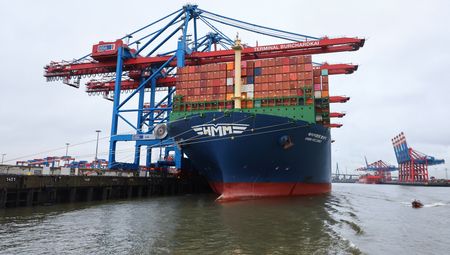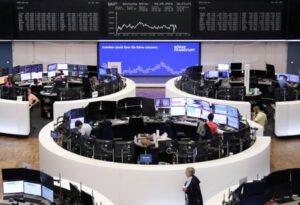By Maria Martinez
(Reuters) -German industrial orders unexpectedly rose in July, but the increase was flattered by some large orders, making economists doubtful the sluggish sector was on the cusp of a sustained upturn.
Orders rose in July by 2.9% on the previous month on a seasonally and calendar adjusted basis, data showed on Thursday, wrongfooting analysts who had forecast a fall of 1.5%.
In addition, the statistics office revised up data for June to show a 4.6% increase on the month from a previous figure of 3.9%.
“Even with the second good figure in a row, incoming orders are likely to remain a lonely island in the sea of weak data, especially as large orders played the decisive role here,” said Jens-Oliver Niklasch, senior economist at LBBW bank.
Large scale orders posted a 86.5% increase on the month. When these orders – such as for trains, ships and aircrafts were excluded, new orders in July were down 0.4% on the previous month.
Orders appear to have stabilized since the beginning of the year, Commerzbank’s senior economist Ralph Solveen said.
“However, the sentiment indicators, which have been weak up to now, call for caution and at least argue against a rapid turnaround for the better,” Solveen said.
A survey of purchasing managers on Monday suggested the downturn in Germany’s manufacturing sector, which accounts for about a fifth of Europe’s biggest economy, gathered pace in August.
The less-volatile three-month on three-month comparison for industrial orders showed that new orders were 1.7% higher in the period from May to July than in the previous three months.
“The basic trend in orders remains very weak,” said Alexander Krueger, chief economist at Hauck Aufhaeuser Lampe. “In view of a lack of competitiveness and growing competition from abroad, a turnaround is out of the question.”
New foreign orders rose by 5.1% on the month, while domestic orders remained unchanged, the statistics office said.
“German industry is not gaining momentum,” said Michael Herzum, head of economics and macro strategy at Union Investment. “The signs of life in German industry, which have been tentative for some time, are increasingly revealing deeper problems.”
China is in a structural crisis and Germany, as an export nation, is feeling the effects, he added.
(Reporting by Andrey Sychev, Maria Martinez and Rene Wagner, editing by Miranda Murray and Christina Fincher)





